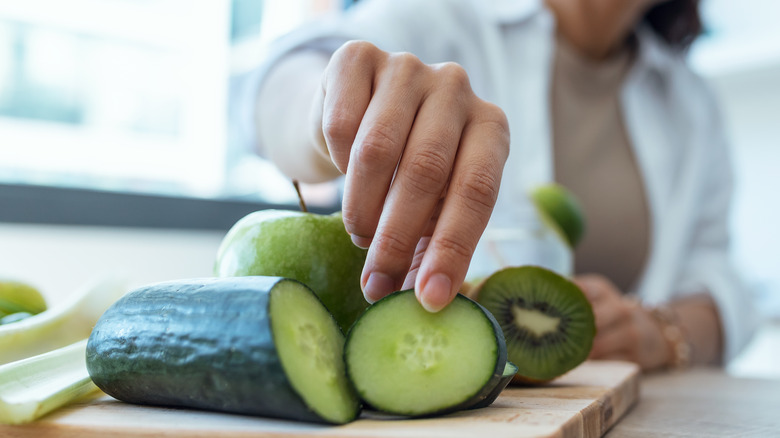The Unexpected Benefits Of Eating Cucumber At Night
Sleep health is multifaceted; there's no one-size-fits-all solution. Putting away electronics, turning down the thermostat, reading a relaxing book, or engaging in a few deep breathing exercises are just a few of the many things that can help boost the quality of sleep. While we're often told to avoid midnight snacking, a small bite before bed may also help us snooze a little more soundly — if we choose wisely. Enter the cucumber.
Although these veggies are predominantly made up of water, you'll also find over 39 milligrams of magnesium, 48.2 milligrams of calcium, 72.2 milligrams of phosphorus, and an impressive 442 milligrams of potassium — all in just one singular cucumber, according to the U.S. Department of Agriculture (USDA). The magnesium content, specifically, may help support sleep, per experts at DoveMed.
In a 2012 study published in the Journal of Research in Medical Sciences, researchers found that magnesium supplements boosted sleep efficiency, sleep duration, and sleep latency in older adults diagnosed with insomnia. The study team outlines how magnesium is thought to play a role in nervous system regulation, allowing us to relax.
Cucumbers contain magnesium, melatonin, and B vitamins
In addition to magnesium, cucumbers also harbor melatonin, reports More Smiles Dental Spa. While more study is still needed, researchers from a 2014 scientific assessment published in Nutrition Journal point out how melatonin supplementation may help support our natural circadian rhythm and potentially boost sleep onset latency in those who struggle to fall asleep until much later into the night.
Alternatively, if you spent the night out having a few drinks with a few friends, munching on some cucumber slices before climbing into bed may help you stave off a nasty hangover in the morning (via Orthopedic Center for Sports Medicine). Cucumber gives us back what we lost in B vitamins and electrolytes after consuming alcohol. By maintaining the body's careful balance of essential nutrients, you may just wake up headache-free. Furthermore, one of the B vitamins found in cucumber is thiamine. According to the Alaska Sleep Clinic, thiamine supplementation may promote better-quality sleep.
Too much cucumber may lead to more midnight bathroom runs
While the magnesium, melatonin, and B vitamins found in cucumbers may have benefits to offer when it comes to sleep, there is one ingredient that may potentially work against us. In one singular cucumber (301 grams), you'll find 287 grams of water (per USDA). Because water makes up nearly the entirety of the vegetable, all that H2O will inevitably accumulate in your bladder overnight if you snack on a good bit of cucumber before bed. This can lead to sleep disruptions in the form of bathroom trips during the course of the night.
If you're someone who struggles with sleep, consider speaking with your doctor. Although cucumber won't solve all of our bedtime woes, a few slices of the juicy snack may help when used in combination with other healthy habits. This includes keeping a consistent bedtime and wake time; making time for physical activity during the day; and steering clear of heavy meals, coffee, or alcohol during the evening hours.



